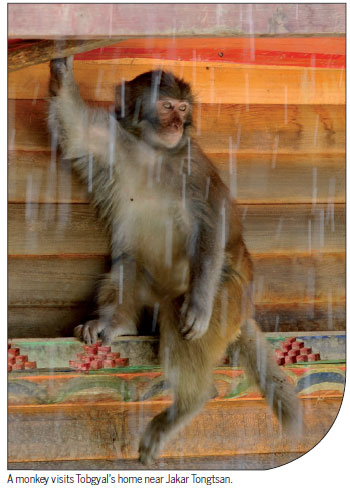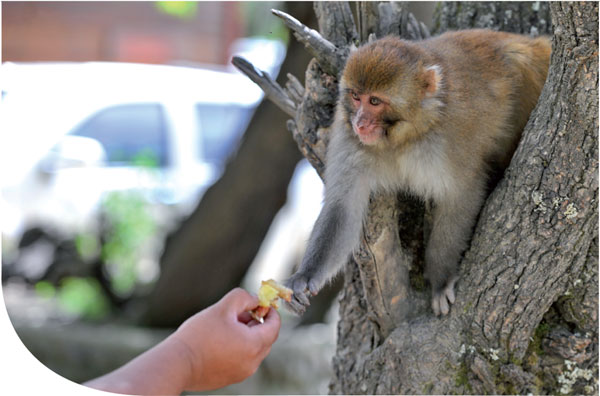Forest ranger's dedication helps monkeys thrive
|
A macaque receives fruit off ered by Tobgyal at his village.Photos By Palden Nyima / China Daily |
Jakar Tongtsan's primate population rose from 20 to 2,000 in 17 years
Every morning when Tobgyal arrives in his pickup at the bottom of the Nori Hill, the monkeys hear the blast of his horn. "Come, come," Tobgyal yells, and the monkeys run to him immediately.
"The monkeys rush in my direction and stare at the red bag in my hands with their lovely curious eyes," Tobgyal said.
Jakar Tongtsan, a scenic spot in the Drosar township in Kongpo'gyada county, is one of the best places in the Tibet autonomous region to see Tibetan macaques.
The number of macaques in Jakar Tongtsan has increased from 20 in early 1990s to more than 2,000, according to the local government.
It is believed that the growth in the local population is due in part to Tobgyal, who has been feeding the monkeys for 16 years. His kindness has earned him the respect of the local villagers.
His initial contact with the species was due to his job as a forest ranger. Whenever Tobgyal went out on patrol, he shared his lunch with the monkeys in the forest, and when the area became a tourist spot, he was employed as a business manager.

"Behavior that was harmful to the environment, such as leaving trash lying around, reduced the monkeys' natural habitat and caused the population to fall to about 20 in the early 1990s," Tobgyal said. A scarcity of wild fruits forced the monkeys to come down to the bottom of the mountain to survive.
"At first, the villagers were surprised by the unusual visitors; however, they soon grew irritated by the monkeys' behavior such as stealing their crops," he said. "Some people killed monkeys to protect their own interests and rights."
Calls from Tobgyal to protect the natural environment and the monkeys led to the introduction of a series of regulations in 2002.
Felling trees, littering and killing monkeys are now banned and the village has moved to a new location. The local government's regulations to protect the environment have helped to raise the villagers' awareness of environmental protection.
As a result, the number of monkeys has risen dramatically, the ruins of the old village have became a new home for the animals, and the villagers are benefiting from the tourists who came to see the monkeys.
Tobgyal's home is located in a village about 3 kilometers from the tourist spot. Each day he gets up early and, after a simple breakfast, he goes in his truck to feed the monkeys.
He said he shows respect for the monkeys, just as he would do for people, because they also have feelings.
One of Tobgyal's favorites is a red-faced monkey that he has named Marei, or "cute red". Tobgyal first encountered Marei as a starving infant, and he took him home and fed him with cow's milk and soy milk.
Despite the fact his granddaughter Nyima Drolma became attached to Marei, Tobgyal returned the baby monkey to the wild after a short period of time because he was worried the other monkeys would reject him.
Tobgyal learned this lesson after he rescued an injured monkey and kept it in his home for a year. When he took it back to the forest, the other monkeys chased it away.
This time was different. When he took the baby monkey back to the forest, his mother recognized him and accepted him at once.
Marei still remembers Tobgyal even though many years have passed, and whenever Tobgyal goes to feed the monkeys, a red-faced adult monkey can always be seen close by.
Although it is almost time for Tobgyal to retire, he is still committed to his work with the monkeys. One thing that makes Tobgyal happy is that the villagers are no longer violent toward the monkeys, and many even feed them with fruits and nuts.
"I cherish the time together with the monkeys, and the little I have done gives me great happiness," he said. "I hope there is always harmony between people and nature, and that we can live together without harming each other."
palden_nyima@chinadaily.com.cn
|
Tobgyal is a forest ranger working at Jakar Tongtsan, a scenic spot in Kongpo’gyada county, the Tibet autonomous region. Tobgyal feed Tibetan macaques living around Jakar Tongtsan. |











